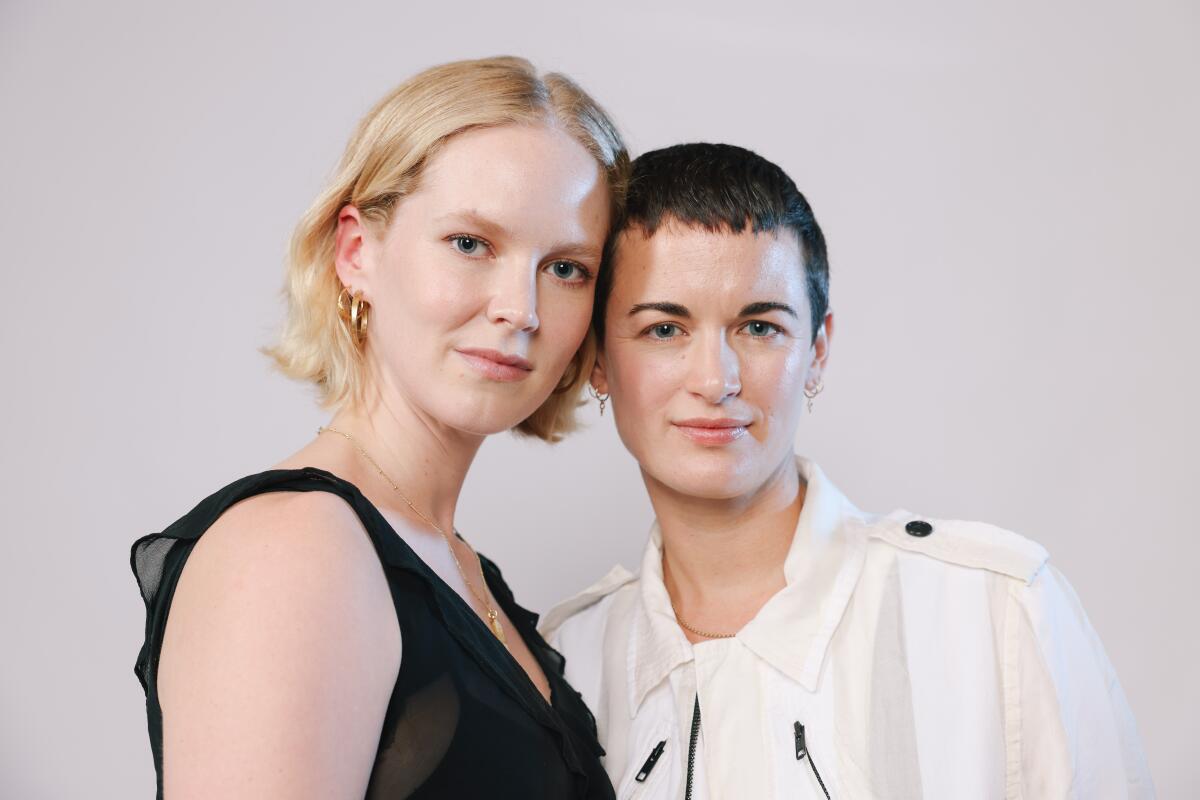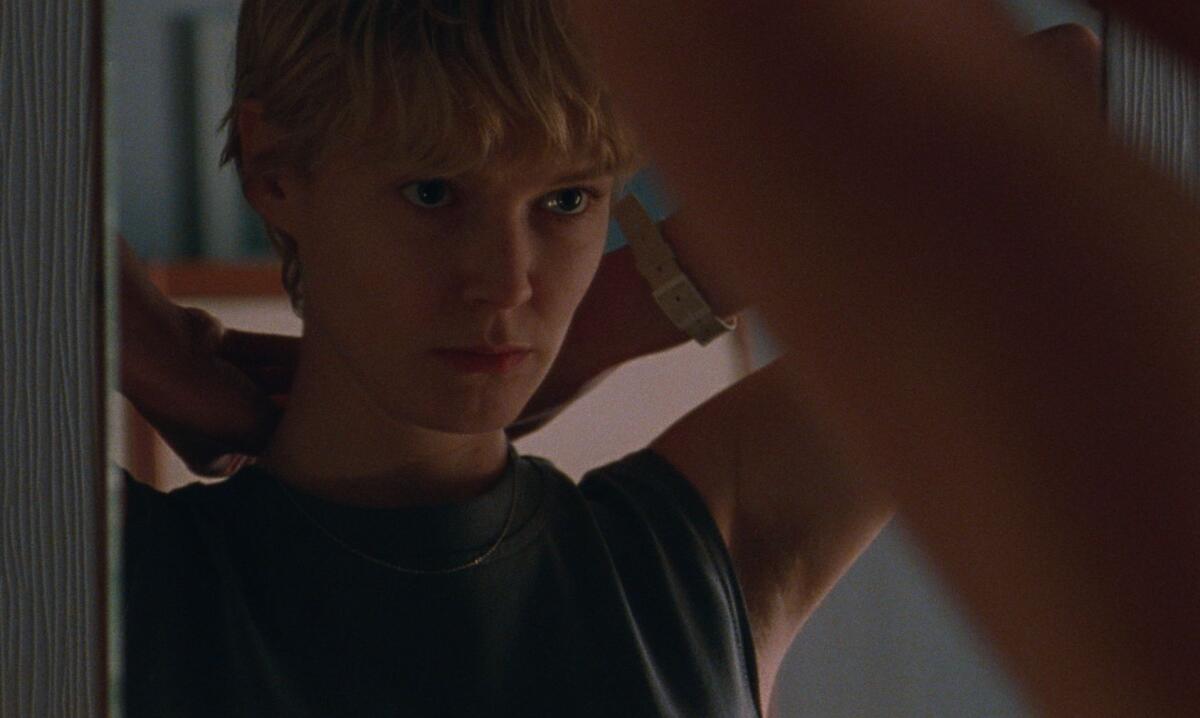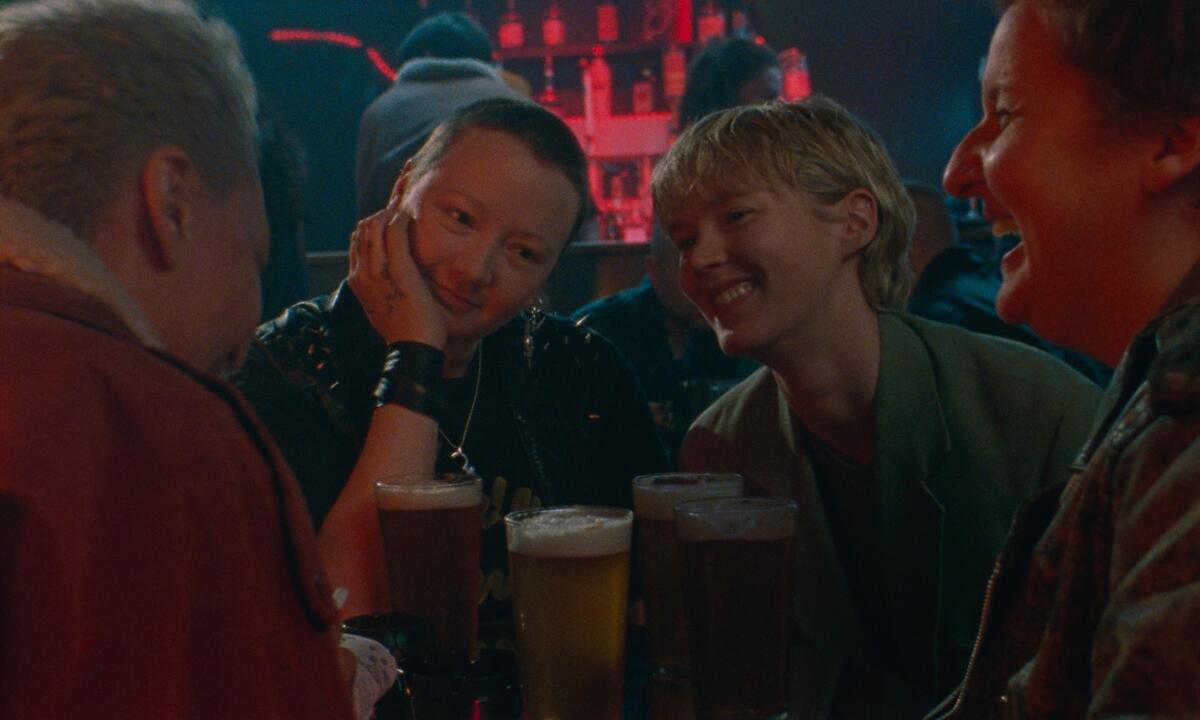New film ‘Blue Jean’ shows how anti-gay ‘moral panic’ consumes schools — then and now

- Share via
LONDON — In 1988, the British government passed Section 28, prohibiting the teaching of homosexuality in schools. The law is at the heart of Georgia Oakley’s heartfelt debut feature, “Blue Jean,” a film that reflects on the everyday toll Section 28 took on Britain’s gay and lesbian community.
The story, about Jean (Rosy McEwen), a lesbian PE teacher living in Newcastle, is set against the backdrop of the law’s introduction by Prime Minister Margaret Thatcher’s Conservative government. Despite its historic setting, “Blue Jean” echoes strongly with issues of today, notably Florida’s “Don’t Say Gay” bill.
“When we were pitching the film and attempting to get the first round of financing, my producer [Hélène Sifre] and I were really pushing those parallels,” says Oakley, who came up with the idea after seeing a video of a group of lesbians rappelling into the House of Lords during a debate about the law. “In the past five years, the relationship between the story of ‘Blue Jean’ and what is going on in the world around has taken a whole new trajectory. It’s impossible to watch the film without thinking about these new laws.”
Initially, Oakley wondered if she should make a film about the women who protested in the House of Lords. But she quickly moved on to a more personal story as she began thinking about what it would have been like to be a teacher of impressionable youth during the era of Section 28.
“I was in education for most of that time, and I hadn’t realized what a huge effect this law had had on my life,” she says. “I was simultaneously unraveling the effect that it had had on me and also thinking about the situation from the perspective of a teacher. I was interested in the way that, as a sports teacher, your whole job is concerned with bodies.”

When she started writing the script, Oakley immediately understood the psychology of Jean, a cool, emotionally reserved woman living a semicloseted life in the north of England. Although Jean is not based on anyone in particular, Oakley spoke with several actual teachers, and two of them, Sarah Squires and Catherine Lee, became consultants on the film.
“It seemed like an exciting way to channel some of my own experiences through the lens of somebody else’s life in this very heightened moment of moral panic in the U.K.,” Oakley says. “I feel like these stories often focus on acts of heroism that lead to whatever change happens. I’m more interested in an ordinary person who is forced into the situation against her will — and who makes very questionable decisions as a result of it.”
While Jean’s girlfriend, Viv (Kerrie Hayes), is an out and proud lesbian, Jean remains closeted at the secondary school where she teaches. Oakley wanted to portray Jean’s struggle with her sexuality without depicting more overt anti-gay incidents, which were described to her by the women she spoke to during her research process.
“They would have stories about having a brick through their car window — really aggressive, violent acts of homophobia that resulted in people being arrested,” Oakley says. “I chose to focus more on the microaggressions that I knew that they would have been enduring, but also that I could relate to going through most days. Through doing that, I felt that the story would be easier to relate to for contemporary audiences. But also that it would hopefully push it away from being a story just about the queer community and be something that anyone who’s ever had any experience of being othered could find a way into it.”
McEwen was cast as Jean in early 2021 and spent a year developing the character prior to shooting, due to COVID-related production delays. To prepare, the actor surrounded herself with everything Jean would have consumed at the time: newspaper articles, TV programs, ’80s music. Like Jean, McEwen watched a lot of “Blind Date,” a popular show at the time.

“Everything she was seeing and digesting that represented heteronormativity was really important for me,” McEwen says. “Everything that was [making her think] that what she was feeling was wrong or shameful. Seeing the barriers of ‘normal family dynamics,’ which is how Section 28 describes it, was important. There were no [cell]phones or internet, so all of this was subliminal messaging she was experiencing on a daily basis.”
Prior to Oakley’s research on the script, not much existed about the real-life women who endured Section 28. Although the law was abolished in England in 2003, McEwen likens it to “a shameful secret that was brushed under the carpet.” Her initial FaceTime conversation with Lee brought the scope of the film into perspective.
“One of the first things she said to me was, ‘I wish I had been braver,’ ” McEwen says. “It was very clear that she still was very close to that time in her life, even though it had been 30 years. It was an emotional conversation, and it made me realize how precious this story was. It wasn’t about me doing really good acting. It was actually about these women.”
Jean’s story is fictionalized, but Oakley and her crew brought historic elements of the time period. The film was shot in Newcastle, in a real school that retained the look of the ’80s. The radio snippets and TV news broadcasts about Section 28, which Jean watches and hears throughout the film, were taken from the BBC archive.
“It was important for the audience to digest [the news media] the same way that Jean would have digested it, because it’s subtle,” McEwen adds. “All that homophobia isn’t in your face. It slowly chips away at you to the point where you are constantly reminded that what you feel is completely abnormal.”
Today, Britons remain divided about Section 28. Many fought against it and view it as a terrible stain on the country’s history. Some may have backed it, but now speak about the law with regret. Others still contend it was a positive thing. In 2018, as Oakley was developing “Blue Jean,” protests took place around the country against a government scheme called “No Outsiders,” which aimed to teach children about the characteristics protected by the Equality Act.
“It was essentially teaching primary school children for the first time that queer people exist,” Oakley says. “But it wasn’t just about LGBTQ issues — it was also teaching kids that some families have one mom or one dad. And is obviously a very positive thing. But thousands and thousands of children were taken out of school by their parents because they didn’t want their kids learning that. That attitude, that feels to me to be similar to that of the time I grew up. ‘Do whatever you want, but keep it behind closed doors,’ which is what we show in the film. That’s still around in the U.K., and elsewhere.”
The Board of Education approved a ban on classroom instruction about sexual orientation and gender identity in all grades.
While “Blue Jean” is an intimate story about one woman, Oakley views it as inherently political. The film is one of the first movies made about lesbians by queer women in the U.K., an important distinction. It raises issues from the past that have come full circle today. Oakley hopes viewers feel roused by watching it and that they will carry that energy into their own lives.
“By making a film about this particular issue, it is my contribution to the ongoing discussion,” Oakley says. “I hope that people will engage with that.”
As politicians around the world, including in the U.S., continue to target LGBTQ+ communities, that discussion couldn’t be more relevant.
More to Read
Only good movies
Get the Indie Focus newsletter, Mark Olsen's weekly guide to the world of cinema.
You may occasionally receive promotional content from the Los Angeles Times.











